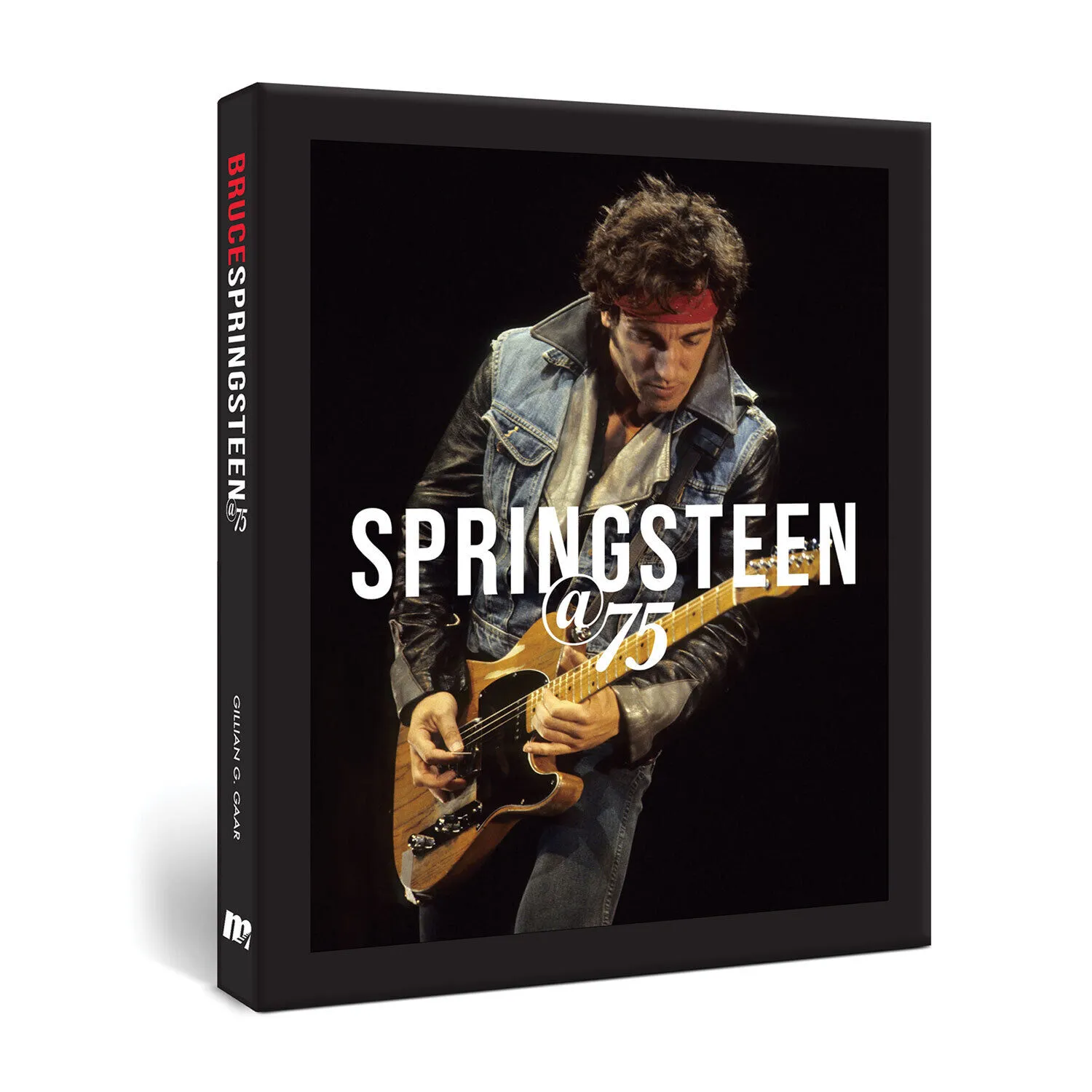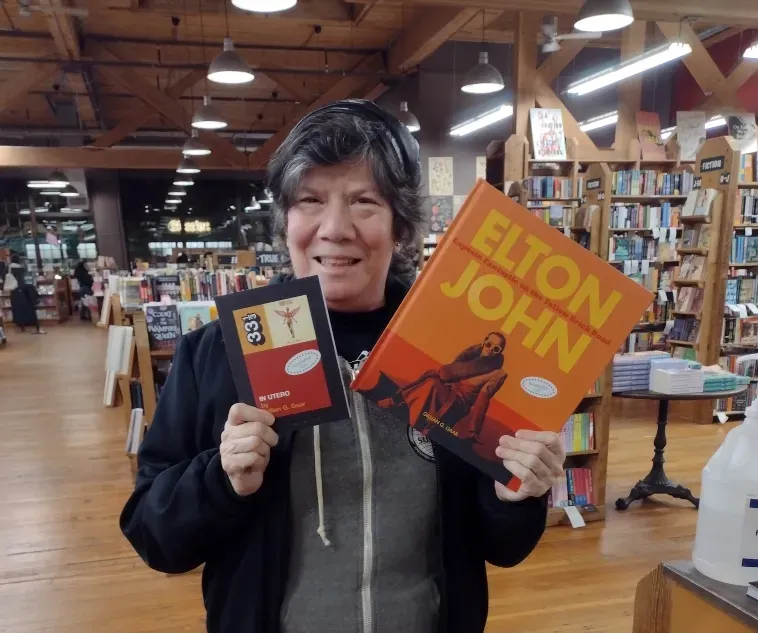Music scribe, historian, and longtime Capitol Hill fixture Gillian G. Gaar is celebrating her 19th book release, Bruce Springsteen at 75, which came out in April. Although the iconic rocker, known for his blue-collar roots, poetic lyrics, and marathon sets, doesn't actually turn 75 until September, Gaar's book lays out his entire history, from his anonymous New Jersey beginnings to a transcendent and fecund rock and roll deliverance. She kindly took a few questions.
Andrew Hamlin: Asked to name his "desert-island discs," Bruce picked records by Elvis Presley, the Beatles, the Rolling Stones, Van Morrison, Marvin Gaye, James Brown, Bob Dylan, and the Four Tops. What do these points on his musical map tell us about his overall sensibility?
Gillian Gaar: The average listener isn't going to know much about Bruce, so learning what songs are his favorites is a great introduction to his influences. Note that there are no post-'60s artists listed here. He's very much founded in classic rock and soul. Which I suppose is why he eventually did a soul covers album (Only the Strong Survive).
AH: I was shocked and amused to find a picture of Springsteen and saxophonist Clarence Clemons kissing... onstage during the "Born in the USA" tour! Did they do this often? Was it wild abandon, sticking it to the squares, and/or something else?
GG: The Boss and "the Big Man" had a very close relationship. They each said, when they really got to know each other, that they felt they had found a brother for life. And so it proved. Yes, their onstage interactions often did end in a big sloppy kiss. I was surprised there wasn't more reaction at the time, but maybe it was because it wasn't splashed all over the news. I would put it down to freewheeling high spirits, or "wild abandon" as you put it. Two guys comfortable in their own skins.
AH: Have you ever seen Springsteen play live? If so, where and when?
GG: I only saw him once, at Climate Pledge Arena in 2023. Interesting to see a large-scale show with no "effects," video graphics, etc. Just a bare stage and the musicians. Boy, the crowd was into it... they were "Broooo-cing" well before the lights went out! That was fun. Not having the all the extraneous stuff (video graphics) meant you could focus on the music, which made it more powerful.
AH: Bruce is known as a friend to the LGBT+ community. Did his Oscar-winning "Streets of Philadelphia" song mark him as a sympathetic straight, or was he known as such beforehand?
GG: He did a good interview with The Advocate at the time of the film's release, which may be online somewhere. He said he had a very "hetero" image, especially because of his pumped-up look during the "Born in the USA" tour, and so he felt that doing the "Streets of Philadelphia" song helped him reach out to the LGBT+ community in a way he'd never been able to do before. He said numerous people came up to him and thanked him for the song, which must've felt good.
AH: What, in your view, primed Springsteen's sympathy and empathy toward minority communities, and people in need?
GG: Probably [having grown] up impoverished himself. He really lived a hand-to-mouth existence until his career took off. Once it did, and he began playing large arenas, he always let local activist organizations set up tables at his shows and made donations to local organizations, like food banks.
It took him a while, but eventually he began speaking out on political issues that concerned him, starting with veterans' groups. If you look at online tour itineraries set up by fan websites, you see that he plays a lot of benefits, but most of them are small-scale local things, so they don't get a lot of coverage. He's said in interviews that since he's done so well financially, he feels he has a responsibility to give something back.
AH: The long-running and originally Seattle-based Springsteen magazine Backstreets shut down, protesting Springsteen's seemingly callous reaction to ticket prices in the thousands of dollars. What's your take on that issue?
GG: It was a pretty tone-deaf response; in one instance, he said, "But if there's any complaints on the way out, you can have your money back." Yeah, venues don't offer refunds for that reason... or any other reason, really (unless you buy "ticket insurance," which I see is offered at some shows). No one's saying he should perform for free, but having "dynamic pricing" resulting in tickets going for $5K each on the day of sale felt like price gouging. Which seemed to fly in the face of his "man of the people" image.
AH: Charley Cross, who died early in August, founded Backstreets and was one of the most intense fans of Springsteen, among music journalists at least. You knew him well and worked alongside him at The Rocket. What were his most important perspectives on Springsteen? Did he see your book, react to it at all?
GG: The Backstreets offices were right next to the Rocket offices, but Charley kept them pretty separate; he never put the new Springsteen album on the Rocket office stereo, for example. So it wasn't pushed on us in any way.
I would flip through the magazines and subsequent book on occasion. But I didn't really read the book until I was working on my first Springsteen book [Boss: Bruce Springsteen and the E Street Band, The Illustrated History]. The Backstreets book is a compilation of some of the articles in the magazines and also had a sessionography and tour guide...really great for Bruce fans, as there were no online resources to rely on. The articles were useful for a researcher, as the magazine spoke to many people who were in the inner circle. So it was a great resource.
Charley did know about my book, and I was planning on giving him a copy of it. Too bad that couldn't happen.

Support the Seattle Gay News: Celebrate 50 Years with Us!
As the third-oldest LGBTQIA+ newspaper in the United States, the Seattle Gay News (SGN) has been a vital independent source of news and entertainment for Seattle and the Pacific Northwest since 1974.
As we celebrate our 50th anniversary, we need your support to continue our mission.
Your contribution will ensure that SGN remains a beacon of truth and a virtual gathering place for community dialogue.
Help us keep printing and providing a platform for LGBTQIA+ voices.
How you can donate!
Using this Link
Text "SGN" to 53-555
Or Scan the QR code below!



